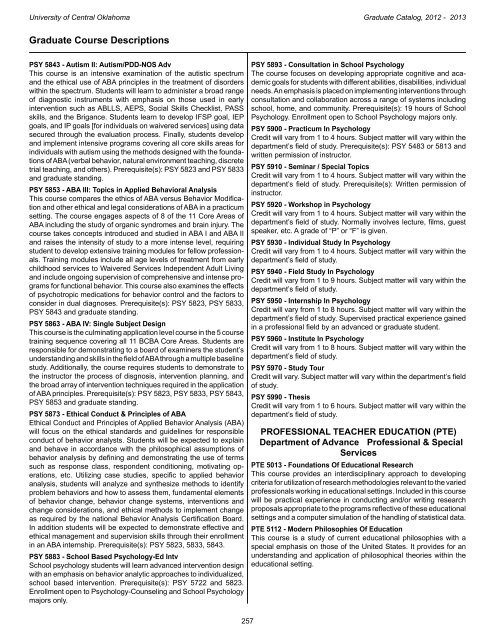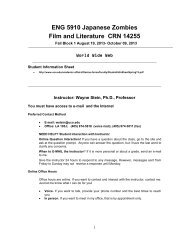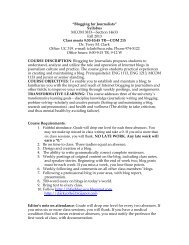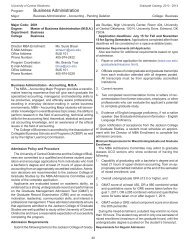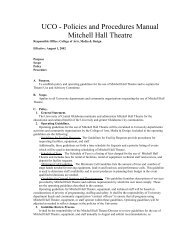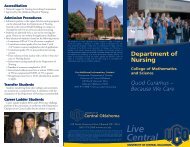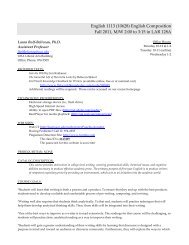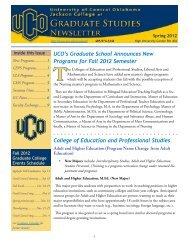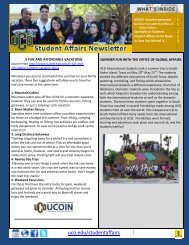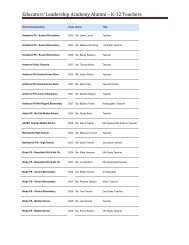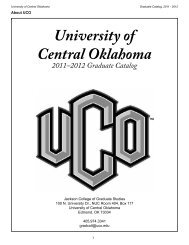Graduate Catalog - University of Central Oklahoma
Graduate Catalog - University of Central Oklahoma
Graduate Catalog - University of Central Oklahoma
You also want an ePaper? Increase the reach of your titles
YUMPU automatically turns print PDFs into web optimized ePapers that Google loves.
<strong>University</strong> <strong>of</strong> <strong>Central</strong> <strong>Oklahoma</strong><br />
<strong>Graduate</strong> <strong>Catalog</strong>, 2012 - 2013<br />
<strong>Graduate</strong> Course Descriptions<br />
PSY 5843 - Autism II: Autism/PDD-NOS Adv<br />
This course is an intensive examination <strong>of</strong> the autistic spectrum<br />
and the ethical use <strong>of</strong> ABA principles in the treatment <strong>of</strong> disorders<br />
within the spectrum. Students will learn to administer a broad range<br />
<strong>of</strong> diagnostic instruments with emphasis on those used in early<br />
intervention such as ABLLS, AEPS, Social Skills Checklist, PASS<br />
skills, and the Brigance. Students learn to develop IFSP goal, IEP<br />
goals, and IP goals [for individuals on waivered services] using data<br />
secured through the evaluation process. Finally, students develop<br />
and implement intensive programs covering all core skills areas for<br />
individuals with autism using the methods designed with the foundations<br />
<strong>of</strong> ABA (verbal behavior, natural environment teaching, discrete<br />
trial teaching, and others). Prerequisite(s): PSY 5823 and PSY 5833<br />
and graduate standing.<br />
PSY 5853 - ABA III: Topics in Applied Behavioral Analysis<br />
This course compares the ethics <strong>of</strong> ABA versus Behavior Modification<br />
and other ethical and legal considerations <strong>of</strong> ABA in a practicum<br />
setting. The course engages aspects <strong>of</strong> 8 <strong>of</strong> the 11 Core Areas <strong>of</strong><br />
ABA including the study <strong>of</strong> organic syndromes and brain injury. The<br />
course takes concepts introduced and studied in ABA I and ABA II<br />
and raises the intensity <strong>of</strong> study to a more intense level, requiring<br />
student to develop extensive training modules for fellow pr<strong>of</strong>essionals.<br />
Training modules include all age levels <strong>of</strong> treatment from early<br />
childhood services to Waivered Services Independent Adult Living<br />
and include ongoing supervision <strong>of</strong> comprehensive and intense programs<br />
for functional behavior. This course also examines the effects<br />
<strong>of</strong> psychotropic medications for behavior control and the factors to<br />
consider in dual diagnoses. Prerequisite(s): PSY 5823, PSY 5833,<br />
PSY 5843 and graduate standing.<br />
PSY 5863 - ABA IV: Single Subject Design<br />
This course is the culminating application level course in the 5 course<br />
training sequence covering all 11 BCBA Core Areas. Students are<br />
responsible for demonstrating to a board <strong>of</strong> examiners the student’s<br />
understanding and skills in the field <strong>of</strong> ABA through a multiple baseline<br />
study. Additionally, the course requires students to demonstrate to<br />
the instructor the process <strong>of</strong> disgnosis, intervention planning, and<br />
the broad array <strong>of</strong> intervention techniques required in the application<br />
<strong>of</strong> ABA principles. Prerequisite(s): PSY 5823, PSY 5833, PSY 5843,<br />
PSY 5853 and graduate standing.<br />
PSY 5873 - Ethical Conduct & Principles <strong>of</strong> ABA<br />
Ethical Conduct and Principles <strong>of</strong> Applied Behavior Analysis (ABA)<br />
will focus on the ethical standards and guidelines for responsible<br />
conduct <strong>of</strong> behavior analysts. Students will be expected to explain<br />
and behave in accordance with the philosophical assumptions <strong>of</strong><br />
behavior analysis by defining and demonstrating the use <strong>of</strong> terms<br />
such as response class, respondent conditioning, motivating operations,<br />
etc. Utilizing case studies, specific to applied behavior<br />
analysis, students will analyze and synthesize methods to identify<br />
problem behaviors and how to assess them, fundamental elements<br />
<strong>of</strong> behavior change, behavior change systems, interventions and<br />
change considerations, and ethical methods to implement change<br />
as required by the national Behavior Analysis Certification Board.<br />
In addition students will be expected to demonstrate effective and<br />
ethical management and supervision skills through their enrollment<br />
in an ABA internship. Prerequisite(s): PSY 5823, 5833, 5843.<br />
PSY 5883 - School Based Psychology-Ed Intv<br />
School psychology students will learn advanced intervention design<br />
with an emphasis on behavior analytic approaches to individualized,<br />
school based intervention. Prerequisite(s): PSY 5722 and 5823.<br />
Enrollment open to Psychology-Counseling and School Psychology<br />
majors only.<br />
PSY 5893 - Consultation in School Psychology<br />
The course focuses on developing appropriate cognitive and academic<br />
goals for students with different abilities, disabilities, individual<br />
needs. An emphasis is placed on implementing interventions through<br />
consultation and collaboration across a range <strong>of</strong> systems including<br />
school, home, and community. Prerequisite(s): 19 hours <strong>of</strong> School<br />
Psychology. Enrollment open to School Psychology majors only.<br />
PSY 5900 - Practicum In Psychology<br />
Credit will vary from 1 to 4 hours. Subject matter will vary within the<br />
department’s field <strong>of</strong> study. Prerequisite(s): PSY 5483 or 5813 and<br />
written permission <strong>of</strong> instructor.<br />
PSY 5910 - Seminar / Special Topics<br />
Credit will vary from 1 to 4 hours. Subject matter will vary within the<br />
department’s field <strong>of</strong> study. Prerequisite(s): Written permission <strong>of</strong><br />
instructor.<br />
PSY 5920 - Workshop in Psychology<br />
Credit will vary from 1 to 4 hours. Subject matter will vary within the<br />
department’s field <strong>of</strong> study. Normally involves lecture, films, guest<br />
speaker, etc. A grade <strong>of</strong> “P” or “F” is given.<br />
PSY 5930 - Individual Study In Psychology<br />
Credit will vary from 1 to 4 hours. Subject matter will vary within the<br />
department’s field <strong>of</strong> study.<br />
PSY 5940 - Field Study In Psychology<br />
Credit will vary from 1 to 9 hours. Subject matter will vary within the<br />
department’s field <strong>of</strong> study.<br />
PSY 5950 - Internship In Psychology<br />
Credit will vary from 1 to 8 hours. Subject matter will vary within the<br />
department’s field <strong>of</strong> study. Supervised practical experience gained<br />
in a pr<strong>of</strong>essional field by an advanced or graduate student.<br />
PSY 5960 - Institute In Psychology<br />
Credit will vary from 1 to 8 hours. Subject matter will vary within the<br />
department’s field <strong>of</strong> study.<br />
PSY 5970 - Study Tour<br />
Credit will vary. Subject matter will vary within the department’s field<br />
<strong>of</strong> study.<br />
PSY 5990 - Thesis<br />
Credit will vary from 1 to 6 hours. Subject matter will vary within the<br />
department’s field <strong>of</strong> study.<br />
PROFESSIONAL TEACHER EDUCATION (PTE)<br />
Department <strong>of</strong> Advance Pr<strong>of</strong>essional & Special<br />
Services<br />
PTE 5013 - Foundations Of Educational Research<br />
This course provides an interdisciplinary approach to developing<br />
criteria for utilization <strong>of</strong> research methodologies relevant to the varied<br />
pr<strong>of</strong>essionals working in educational settings. Included in this course<br />
will be practical experience in conducting and/or writing research<br />
proposals appropriate to the programs reflective <strong>of</strong> these educational<br />
settings and a computer simulation <strong>of</strong> the handling <strong>of</strong> statistical data.<br />
PTE 5112 - Modern Philosophies Of Education<br />
This course is a study <strong>of</strong> current educational philosophies with a<br />
special emphasis on those <strong>of</strong> the United States. It provides for an<br />
understanding and application <strong>of</strong> philosophical theories within the<br />
educational setting.<br />
257


